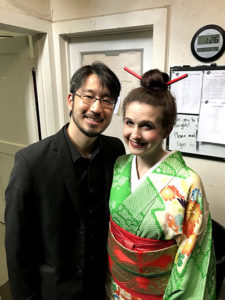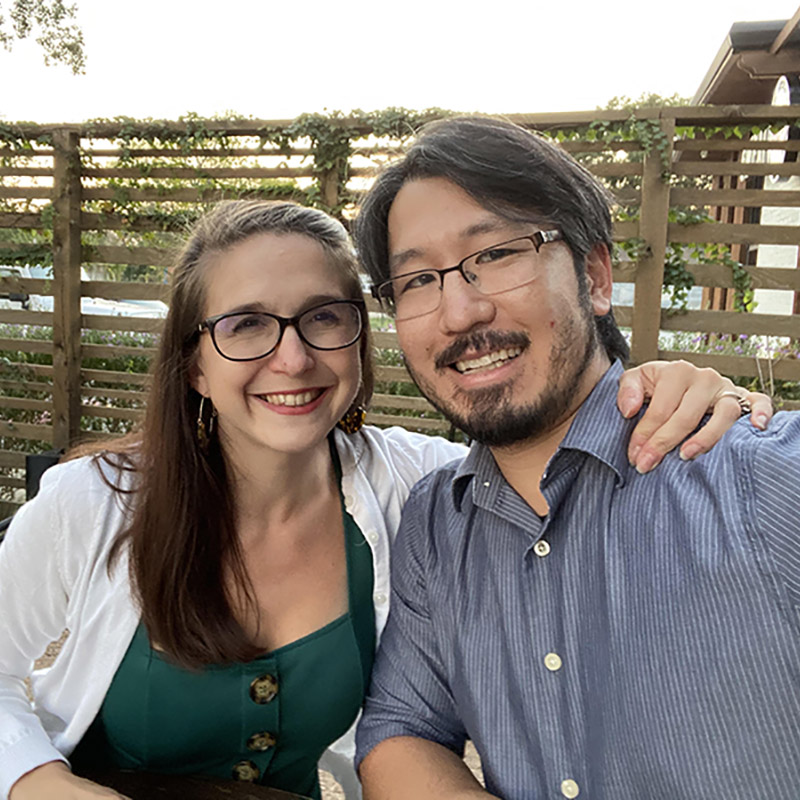Monica (MM ’10 voice) and Eiki (DMA ’12 orchestral conducting, BMA ’04 music theory) Isomura met during their time at Michigan. They live in Houston where Eiki is the artistic director of Opera in the Heights and Monica has a successful private voice studio.
Tell us a little bit about yourselves and what you’re doing now professionally.
Monica: I’m a singer. Well, I used to be. No, don’t say that. I am a classical singer. I’m an opera singer. With a DMA in voice. Who now sings as much as I can in the city in which I live and I’ve dedicated my professional life mostly to teaching voice to dedicated and talented students.
Eiki: After getting my doctorate at Michigan in 2012, I taught college orchestra for five years and also did a lot of opera coaching. I joined Opera in the Heights in 2015 as its interim conductor and now serve as its artistic director and interim general director.
What does it mean to you to be an artist in these times and working at an arts organization?
Monica & Eiki:
The circumstances may change, and the way your product looks and sounds may change, but your underlying mission, whether it be of your organization or of your own personal activity, has to remain grounded. For Opera in the Heights, whose mission is to provide a stage for emerging opera professionals, the stage may be different and the opportunities may not be what we’ve previously envisioned. It nonetheless remains our responsibility to engage artists in a meaningful way that our new environment safely allows, such as digitally produced short films and pop-up outdoor performances, as a way to advance the careers of deserving artists in our uncertain world.
What inspires you as a performer/collaborator/teacher?
Monica: My students’ passion for their art/learning through their unjaded eyes. Seeing how they’re driven and excited. There’s a fire underneath them that reminds me of, and reconnects me to, why I dedicated myself to this craft in the first place.
Eiki: I find myself very inspired by the entrepreneurship of many of my colleagues who demonstrate the courage and determination to make something new. I am also inspired by people who, no matter how busy and overwhelmed they might become, they always make time to be generous and kind friends and colleagues. We’re very close friends with fellow alumnae Ana Maria Otamendi and Elena Lacheva who built the Collaborative Piano Institute, which boasts a truly world-class faculty. I have some sense of the staggering amount of work it takes to do something like that, but more than anything it’s their courage, determination, and their incredible track record as professionals who genuinely care for their colleagues and friends, that are so hard to imitate.
What is special about Michigan?
Monica: SMTD has an incredibly distinguished faculty that not only have their students’ professional achievements in mind but also their personal growth and wellbeing. They have a way of taking a chance on the underdog- that student with great potential or something extremely unique but may not fit into a particular box. The supportive culture that permeates the classroom, studios, and the entire building kept us going through the rigors of the program and continues to keep us connected to our love and dedication for the artform.
Eiki: I did two degrees at Michigan, my undergrad and my doctorate. Naturally they were different experiences but a few things stand out in my mind as constants through my years there: I always felt humbled and yet always felt like I belonged. The Collage Concert always encapsulated this feeling for me; one performance after another blew me away, and yet there I was on that stage too, standing by to play a small part in something big and meaningful. That feeling seemed to permeate the hallways at the music school on a day-to-day basis, and I think that’s pretty special.

Eiki and Monica Isomura backstage at Opera in the Heights’ original co-production with Pacific Opera Project of a bilingual (Japanese-English) adaptation of Madama Butterfly.
How have you adapted your artistic practice during the pandemic professionally and/or personally?
Monica: I have taught all my lessons over zoom for the past 6 months. I have taken my entire studio of 20-some students on zoom. I figured out how to best serve them on this new platform. Being forced to face the challenges of online learning, they all have grown in ways that they likely would not have in person, most significantly, in the realm of musical independence.
Eiki: At Opera in the Heights, we knew our small 300 seat theater in a converted 100 year-old church, was never going to meet our event safety standards from a distancing and ventilation standpoint. We’ve therefore given up our venue for the year and have committed to presenting our programming outdoors. We’ve been working remotely effectively and long enough that we’ve decided to give up our offices, too, in order to control expenses in this unpredictable time.
How are you incorporating social justice issues into your work?
Monica: After watching Eiki’s collaboration with the wonderful Black singers at Opera in the Heights in the wake of the death of George Floyd, I was deeply moved and inspired to seek out the music of some of the great black female composers to whom I had never before been exposed, and assign this repertoire to my students. This all comes full circle, when one of my students, a gifted African-American soprano beginning her senior year at the Houston High School for the Performing and Visual Arts, was so inspired by one of these songs, in particular a performance she found on youtube of SMTD voice professor, Louise Toppin, performing this song, that she decided to make the of UM her first choice for schools and write directly to this professor to express the impact her performance had on her.
Eiki: I began by paying close attention to the social media posts of a number of my company choristers who are Black and particularly outspoken about educating their circles about racial injustice. I reached out to them and asked if they would be comfortable and willing to record some socially-distanced performances together to raise funds for social justice non-profits. I invited the singers to choose their song and their benefiting organization. Most were willing to collaborate with me in person with ample distance; some collaborated with me remotely with asynchronous recording. By posting these videos with facebook fundraisers attached, we successfully raised thousands of dollars for organizations like the NAACP Legal Defense Fund and Southern Poverty Law Center. Raising funds for social justice groups is a good place to start, but opera companies, mine included, have a lot more work to do in order to address the racial inequities we’ve helped to perpetuate. Opera has historically been a product and proponent of white supremacy, and it will take persistence from principled leaders to change the culture to a more equitable one.
What has been your artist journey?
Monica: I got a BM, MM, and DMA in voice performance with the full intention of being a professional singer and voice teacher. I did just that, but my career looks a bit different from how I imagined it. I had some success early on in the young artist track, but that avenue stalled. Immediately following completion of my doctorate, Eiki and I moved to Houston for his first teaching job. It was there that I found many opportunities to perform on the operatic and concert stage. Over the course of seven years, I’ve managed to establish myself as one of the most sought-after voice teachers for gifted young singers. I have a thriving private studio and have taught at several of the most prestigious youth training programs and schools. While I have not had a career of performing opera full-time, I have made my living as a full-time musician, and I feel artistically fulfilled. I’m so incredibly lucky to be able to make music my livelihood, collaborate with my husband on opera productions and recitals, and raise our two kids without having to travel. We hope to eventually land university professorships in the same city, to start our own young artist program, and continue to perform.
Eiki: When I started my doctorate in orchestral conducting at Michigan, I imagined I would put myself out there for assistant conductor jobs with symphony orchestras or university orchestra director positions. Instead my first job out of school was at a community college in Houston to build an orchestra program from the ground up. Honestly, I felt unfit for the job and was convinced the college would have been better served by someone with an extensive background in string pedagogy, not someone like me with a piano/vocal background. But I did my best to adapt, develop my skills, and approached the task with creativity. Outside of teaching, I found opportunities to serve on the music staff with HGOco, Houston Grand Opera’s outreach division. There too, I felt honestly unfit for the job and that they would have been better served by someone with degrees in collaborative piano (both of my graduate degrees were in orchestral conducting). Whether I deserved it or not, I was rehired time and again by the director of HGOco, where I prepared and performed many world premieres at the piano, not something I would ever consider my strong suit. It was that same person who stepped up to bat for me when Opera in the Heights was looking for a conductor. I now serve as the company’s artistic director and I owe it to two commonly invoked tenets of career-building: 1) do whatever and go wherever you are useful, and 2) find someone to believe in you.


